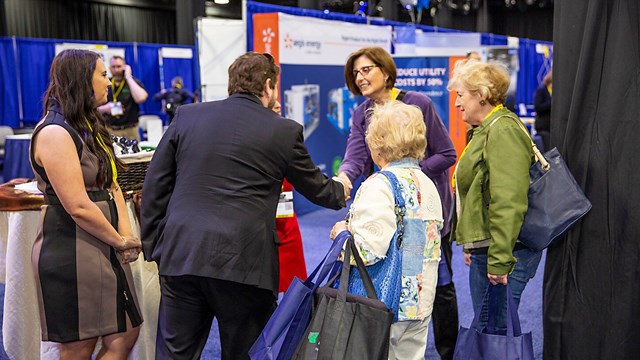Maybe it’s not as annoying as that trip to the dentist, but the annual budget comes around every year just like that dental appointment. And the budget process, say trustees, officers and accountants who are charged with completing it, draws the same amount of enthusiasm as a dental visit.
Nevertheless, an annual budget is the blueprint for the community and will determine its financial well being, or lack of it, for both the upcoming year and for years to come. An efficient, painless budgeting process can be achieved in different ways. One community may attribute its budget success to an active, engaged board of directors, while another may tout the importance of feedback from unit owners. And every annual budget is as unique as its community—a cookie cutter approach just won’t do.
Almost all the participants in the production of the annual budget agree that it’s a basic, down-to earth task that doesn’t necessarily need the help of an accountant or other outside professional.
Active Board Can Move Process Along
Marcia Woods is financial manager for Winterplace at Okemo Condo-minium Owners’ Association in Ludlow, Vermont. The community hires its own staff to manage the property, which wasbuilt in 1985 and now counts 248 units on about 50 acres of slopeside real estate, just a stone’s throw from the Okemo Mountain Ski Resort.
Units are occupied mostly during skiseason, but the business of property management goes on all year. “The board of trustees meets six times a year,” notes Woods.
“The people who are most involved in the process are the board’s treasurer and management staff… and ultimatelythe entire board,” she says.
The budget process she describes is typical of many associations.
“We start the [annual] budget process by the end of June, gathering information” on costs for the coming year. “We have to send out bid requests,” she says, to estimate pricing for servicesand maintenance. “Things get serious in August,” she adds, when staff drafts a new budget, based on past spending and increases that can be anticipated. “It [the budget] contains several sections… [including] the operating account and reserve fund for capital improvements.
“We then present the new budget tothe treasurer in September… he gets the first going-over, then we bring it to the entire board at a meeting in late September,” Woods states.
When it’s finalized and approved by the board, she says, “unit owners get the budget when they receive the [association’s] audited financial statement [from the previous year]. The budget is audited in January or February… and statements go in around March.” She notes that a CPA conducts the independent audit, as required by declaration in the community’s CCRs — covenants, conditions and restrictions.
For line items that don’t fluctuate a lot, such as landscaping or insurance, she continues, “we may use the previous year’s numbers,” adding in price increases on things like fuel.
If the operating budget is overburdened, she says, “and bending into the red in an unforeseen emergency such as water damage, we alert the board” and get approval to raise funds. “Unit owners have always approved any special assessment,” which imposes a one-time increase in fees. “If a loan is required [in an emergency],” she points out, “the lender may attach ourreceivables, since there’s no collateral” on which to attach a lien.
For a community located on a snowy mountain with seasonal use, and amenities that include a recreational building with indoor pool with spas, it would seem that managing the budget would be extra challenging. But Woods attributes smooth operations atWinterplace to the board of directors. “They do an excellent job… they’re very conscientious. The directors and residents are very involved here. They take pride in where they are.”
Budget Process May Start a Year Ahead
In the town of Acton, Massachusetts, the Village of Nagog Woods has a long history. The community employed in-house managers until this year; and it is currently using the services of The Dartmouth Group from Bedford, Massachusetts. Constructed between 1971 and 1974, it incorporates 277 townhouse-style units of two or three bedrooms set on 58 acres. With so many years of experience to draw from, the annual budget should be a breeze for the board’s treasurer—a matter of tweaking a well-honed template.
But it’s not as simple as switching an “automatic” button and having the annual budget churn out. While the physical aspects and maintenance of a community may not change much from year to year, the people involved do. And just as unit owners come and go, volunteers on the boards of trustees in all communities change regularly, often by design.
Long-time Village property manager Jim Shope, PCAM, notes that the level of residents’ involvement in putting together the budget each year “depends on each board… While the condo docs spell out the various financial responsibilities [of the association] it’s up to the board of directors to actuallyset the process for producing the annual budget.”
This can mean that as directors or trustees change, the board may take a different approach to the annual budget.
In communities that are large enoughto employ management personnel, it’s the staff who conducts most of the background work in preparing the budget.
Shope relates that, “We think about the budget all year… the budget process starts almost a year ahead. First, in the spring, we draw up a schedule [of budget meetings] which gets forwarded to all unit owners. This gives them an opportunity to attend meetings and provide input. This mailing may includea survey asking questions about common-area concerns, groundskeeping or other amenities.”
The goal is to discover what residentswant to fund—or not fund—in their community, so the annual budget can be tailored accordingly.
“The input from residents is important,” insists Shope, “because they come up with requests that the board, or staff, would never think of. For instance, people with young children might suggest creation of a ‘tot lot’ or someone may point out that the underused tennis court might be transformed into a basketball court. You have to keep up with the trends that unit owners are thinking about.”
By the end of June, he continues, “The schedule is out. In the next few months, we work with the board treasurer and put the budget together, to present at a meetingin October that’s open to all unit owners… Normally, the turnout [by residents] is low unless there is a special issue people are interested in.”
The budget should be approved by the board in November. This schedule allows the board to set condo fees for the coming year. “In our condo docs,” Shope continues, “it says that unit owners must have a 30-day notice before new fees are set for the coming year, [which] starts on January 1. Payment coupon books must be printed by the first of the year as well,” he adds. Accompanying the coupon books is information about other payment options, such as paying fees online.
Nagog Woods was built in phases with an association that was created for each phase, overseen by an umbrella corporation that is responsible for the annual budget. Each association represents a certain percentage of the total budget. The entire community maintains a number of potentially high-cost line items, such as cedar clapboard siding and two miles of paved road that it owns and takes care of, along with three miles of pathways. All utilities are underground and their maintenance is the community’s responsibility. “We have to budget for that [buried conduit],” says Shope, “and it’s hard to anticipate those [buried infrastructure]problems.”
Despite these factors, Nagog Woods has not had to impose a special assessment since. Shope has worked there, for over 34 years; he has been manager for the last 23. He notes that the reserve fund portion of the budget includes its own plan for revolving, ongoing maintenance. “For instance,” he states, “we might have two buildings per year that will be re-roofed. A typical reserve fund might take up 20 percentof the budget, and be used for these scheduled, major improvements.”
Aside from that, he adds, a contingency fund should be included. “In our community, this represents about two percent of the budget,” says Shope. “But it can be up to 10 percent for some associations, like an urban, high-risebuilding.”
As for hiring an accountant to oversee the annual budget process, he says, “Typically, budget planning doesn’t need an accountant, unless it is a new community with new board members and they need an explanation by an expert… who can provide some training on accounting and proper funding.”
Budget Creation an Art
David A. Levy, CPA, in Brookline, Massachusetts, agrees that an accountant is not as necessary in the budget planning process as due diligence by board members. He recommends subcommittees “to do some research, for a systematic evaluation of the needs of the association… instead of a mathematical formula.”
He notes that an accountant can use mathematical models, but they may have little specific knowledge of the financial situation at any particularcondo community. He also points out that “some boards take the easy route and use a ‘factor’ method… adding [some percentage to cover inflation] to last year’s budget, instead of doing the research and analysis that goes behind the community’s budget.”
He believes that “crafting a budget is an art… that’s not done properly bytoo many associations. Some management companies just take what was spent in the previous year and call a few vendors to check prices.”
Since the ultimate goal of the annual budget is to ascertain what condo fees will be for the coming year, Levy insists, “the fees, and the budget, should be based on the needs and desires of the membership. Budget meetings really need as much input from as many members as possible. Most residents don’t even know they have an option when they’re contracting services that have different costs.”
To illustrate options, he uses an example of snowplowing service. “Does it matter if the blade clears snow down to ¼ inch or one inch, or if salt is applied at 32 degrees or 28 degrees? You have to notify [vendors] and make sure the contract is what [your members] want it to be,” he says.
“If members want a more expensive level of service, they should be willing to pay for it,” he continues, but they should at least know they have that option. He also cites insurance as a cost that often receives little review, “Every line item in the insurance policies should be negotiated… and re-negotiated.” Members may be willing to take higher deductibles in order to lower premium payments. Just as many household budgets leave savings until last, Levy points out, “What gets overlooked in the condo budget is the reserve fund allocation… It tends to get whatever is left over [after operations].”
Conducting a study of reserve fund needs is critical, and it needs to be done in-house, says Levy. “It’s not an accountant’s job. We don’t know the needs of the community… All we can do is lay out numbers.” Rather, the board needs input from engineers or estimators when the reserve fund is reviewed. A consensus about reserve funding has to be made among board members, management and unit owners.
In an ideal world, Levy notes, “The board of trustees would appoint committees to really research the fine print. For instance, a garden committee could look into the sub-accounts that make up the landscaping budget.”
The bottom line with budget-crafting, Levy says, is, “You have to know your community” — from the cost options offered by vendors and contractors to the real needs and wants of unit owners.
Marie Auger is a freelance writer from Westminster, Massachusetts.







Comments
Leave a Comment